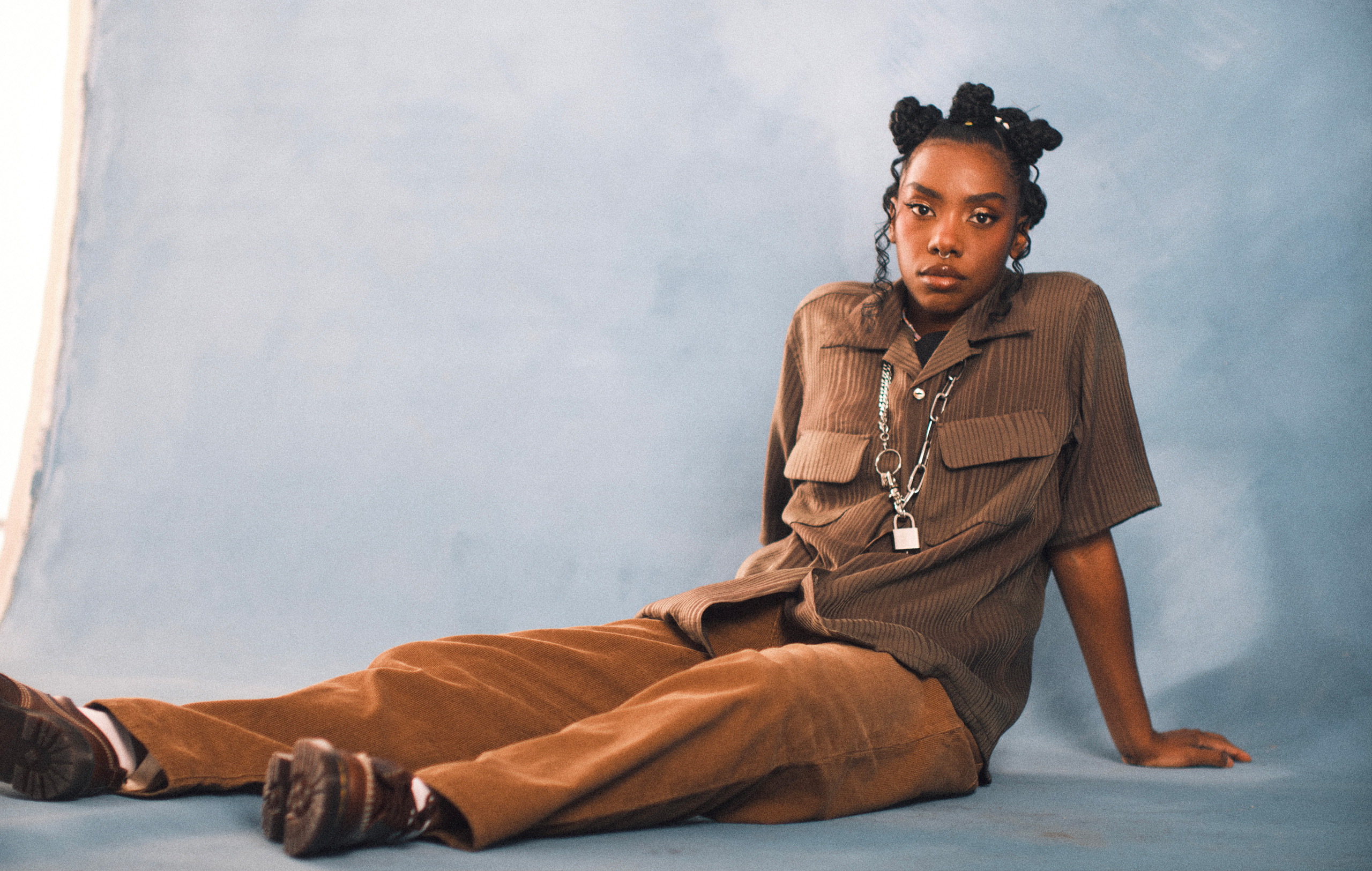There are many things in our world to be horrified about. For Dua Saleh, one of the major issues that’s haunting them is the way we’re treating Earth – and what we’re willing to sacrifice for it.
“I am aghast that we’re willing to destroy our planet to sustain an economic system that will not sustain itself because the pillars of it are destruction,” they tell NME sorrowfully while taking time out of a well-earned slow November day in Los Angeles. As a Sudanese-American who moved to the States as a refugee, they’ve witnessed first-hand the damage and danger caused by the climate crisis. Everything, Saleh reiterates, is linked: environmental, economic and social justice are all related and exist in tandem with personal relationships and circumstances.
Dua Saleh on The Cover of NME. Credit: Kristen Jan Wong for NME
It’s this philosophy they carry in their life and in their music. Although better known for their breakout acting role in Netflix’s Sex Education, Saleh is primarily an artist and began releasing music with their debut track ‘First Take’ in 2017. They swiftly followed it with the dreamy, experimental EP ‘Nūr’, and a further two EPs – including the electronic-fuelled ‘Crossover’ in 2021 – expanded their range. Last October, they opened up their sonic boundaries even further with their debut album, ‘I Should Call Them’.
That latter record is a moving collection of tracks which fuse R&B and jazz to narrate the tale of queer star-crossed lovers as they navigate a deteriorating environment and uncertain future. Against a backdrop of celestial electronics, sultry strings and sweeping guitars, Saleh shifts effortlessly between tender, airy vocals and poignant, on-the-nose delivery. The album, which features guest appearances from Serpentwithfeet, Gallant, Sid Sriram and Ambré, is a project that Saleh has always wanted to make, and R&B was the tool they used to tell a story that connects romance with a biosphere in catastrophe.
“The thing about R&B and Black music at large is that a lot of it is insightful on the worries that we have about the world,” the 30-year-old trans, non-binary musician and actor says, citing ‘The Miseducation of Lauryn Hill’ as an example. “For me, environmental justice is something that is considerably important, being from East Africa and seeing the ways our resources have been exploited.”
“I have a platform and I feel so passionately about using it the right way”
After being displaced from Sudan during the Second Sudanese Civil War and spending their early childhood in a refugee camp in Eritrea, Saleh and their family were relocated to the US, eventually settling in the Rondo neighbourhood of Saint Paul, Minnesota. As a refugee living in a camp, Saleh was exposed to the power of storytelling through spoken word and how truths can be passed on through generations via oration.
“A lot of Islamic traditions are very routed in retelling of tales and archiving memories of what we know is the truth and what we understand is a poetic interpretation of the truth,” they explain. Being from a Muslim family gave them access to masjid, or mosques, and madrasa, Islamic schools, which helped them soak up information quickly from a young age and learn the art of reciting stories. “I keep my music true to storytelling,” Saleh says. “Life is beautiful, and life deserves the beauty of the spoken word in a way that is glimmering.”
Credit: Kristen Jan Wong for NME
But it was life in Saint Paul and Minnesota that further showed them the true political power of music, as Black-pioneered genres such as jazz and hip-hop were practised and celebrated around the city. They kept up appearances with their friends at school by only listening to classic names such as Etta James and Whitney Houston. “I was such a music snob when I was a teenager,” they jest. “I was around people who would be judgemental if you listened to Nicki Minaj. But I love Nicki.”
They also used this time to soak up the offerings of the city. Jazz bands would get out onto the street and play, and bands were forming and practising at their high school, Saint Paul Central High School. The city also played host to Soundset Festival, where Saleh first played their own music and where they kept returning to for inspiration until it ceased running in 2019. “I actually met Yasiin Bey [formerly known as Mos Def] there,” they recall gleefully. “I literally was obsessed – I manifested it. I literally thought, ‘Am I dreaming?’ and he was like, ‘Dua Saleh, yeah, I know your work’. It was crazy.”
“I keep my music true to storytelling”
While ‘I Should Call Them’ is R&B-led, jazz in undertone, and hip-hop storytelling in spirit, Saleh’s 2021 EP ‘Crossover’ was much more electronic-charged and rave-fuelled. “I wanted to make ‘Crossover’ because I love dancing, I love going out to raves – shh, don’t tell my mother,” they joke, letting out a light giggle. “But I love going out and listening to Afrorave music or amapiano, European house music or even UK dance music, like trance.”
Naturally, they were also drawn towards genres like ballroom, disco and techno due to their relevance to queer communities around the globe. Electronic music was one of their first introductions to the West and formed a key part of their learning experience. “A core music memory was watching ’70s disco infomercials as a kid, which was one of my first introductions to American music and culture. It’s also probably how I learned the English language, disco infomercials and Barney [the Dinosaur].”
Credit: Kristen Jan Wong for NME
Learning is not just at the heart of their musicianship – it also guides their acting work. In 2021, Saleh scored their “first real acting job”, playing Cal Bowman on Netflix’s Sex Education, a confident, non-binary student who relocated from Minneapolis. Cal challenges the school’s rigid norms and befriends some of the existing characters, including brainy quiz-team member Viv (played by Chinenye Ezeudu) and popular jock Jackson (Kedar Williams-Stirling).
Playing a gender non-conforming person on a major TV show meant looking inward emotionally. “[I had to] reflect on my own experiences. It felt like the writers maybe tapped into my memory or something,” they say. Cal’s storyline explores Jackson’s romantic confusion toward them, leading Cal to set a boundary that prioritises their own identity. “I had a similar experience to Cal, except my experience was with an ex-girlfriend where I asked if she considered me to be non-binary or trans, and she said no, and I had to process that and re-orient my thoughts and feelings,” Saleh explains. “While I had a different experience to Cal, I had some of the same confusion and trauma.
“This role not only changed my life, but it also changed the way trans and gender non-conforming people viewed their role in mass media,” they continue. “It’s the type of representation I would have wanted to see when I was a kid.”
Credit: Kristen Jan Wong for NME
Moving forward, Saleh wants to continue to be the representation they needed and to use their platform to spread awareness about issues that matter to them. In 2023, they released the single ‘Daylight Falls’, a song filled with shimmering synths and emotive lyrics, creating a wistful atmosphere while maintaining some pop-punk angst. The music video, directed by Braden Lee, explores the tornado of feelings that comes with navigating gender identity and expression and sees Saleh donning a jalabiya, an item of Sudanese clothing, which, although unisex, is more commonly worn by men.
The ongoing civil war in Sudan had been raging for months by the time they shared the single. Saleh wanted to use their position in the public eye to raise awareness of the situation and of the Darfur Women Action Group, which is working to assist marginalised communities in Sudan and, in particular, the region of Darfur.
“Sudanese people can never be people who don’t protest”
“I have a platform and I feel so passionately about using it the right way,” they say. “Some people in Sudan were met with guns at their door – like my uncle did. He was recently murdered by the RSF [Rapid Support Forces], so I couldn’t put that music out without bringing in the eyes that were following me creatively to also witness and proactively understand what horrors were occurring in Sudan. I was shellshocked, and I had no other way to put word out there about my home and my people.”
Although they were involved in raising awareness for different causes at school and now use their art to bring exposure to global issues, Saleh no longer identifies with the label ‘activist’. “People may think I’m actively on the field doing the work, but in reality, I’m just a celebrity who’s informed and I want other people to be well-endowed with the resources necessary and to share that information with others. But I don’t do that in a way that is profound, and I’m not really doing much more than speaking up or showing up for protests or sharing infographics on Instagram.”
Regardless of how you define Saleh’s efforts, their commitment to continuing to show up for the things that are important to them isn’t in question. For them, art is inherently political, and that philosophy drives their work. “I come from a tradition of women and femmes filled with a fullness, which requires empathy and intellectual prowess,” they declare proudly. “Sudanese people can never be people who don’t protest, and I feel like that’s important for people to know.”
Dua Saleh’s ‘I Should Call Them’ is out now via Ghostly.
Listen to Dua Saleh’s exclusive playlist to accompany The Cover below on Spotify or on Apple Music here.
Words: Aneesa Ahmed
Photography: Kristen Jan Wong
Makeup: Chris Georges
Label: Ghostly
The post Dua Saleh is embodying the change they want to see in the world appeared first on NME.




